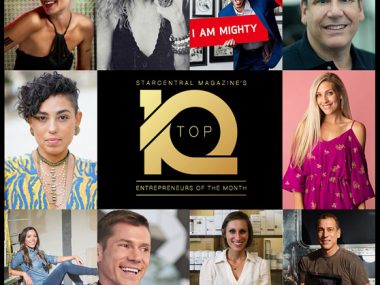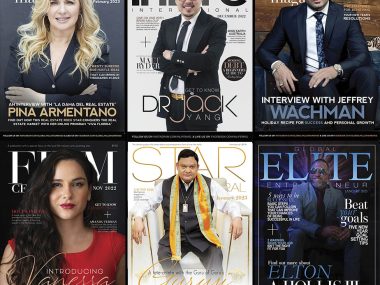Liz Elting is the founder and CEO of the Elizabeth Elting Foundation. She is an entrepreneur, business leader, linguaphile, philanthropist, feminist, and mother. After living, studying, and working in five countries across the globe, Liz started TransPerfect out of an NYU dorm room. During her tenure as Co-CEO, she grew TransPerfect into the world’s largest language solutions company, with over $600 million in revenue, 5,000+ employees, 11,000+ clients, and offices in more than 90 cities worldwide. Liz has been recognized as a NOW “Woman of Power & Influence,” American Express’ and Entrepreneur Magazine’s “Woman of the Year,” one of Forbes’ “Richest Self-Made Women,” and is a recipient of the 2019 Charles Waldo Haskins Award for business and public service from NYU’s Stern School of Business.
StarCentral Magazine recently caught up with Liz Elting to discuss her journey to entrepreneurship and here’s what went down:
1. Could you please tell our readers a brief background about yourself and how you started your business?
My parents taught me from a young age to value my independence and work hard for the things I want in life. And I was fortunate to grow up living, studying, and working in Venezuela, Spain, Portugal, Canada, and the US by the time I was 21. Those experiences fostered in me an entrepreneurial spirit and a love of languages (a combination that shaped my career). I studied modern languages at Trinity and then earned my MBA from NYU Stern. Shortly after getting my business degree, I had a frustrating new job experience that ultimately led me to start my own company. I was working as a broker at a big French bank, but despite my job title, I was tasked with taking notes, making coffee, and answering the phone; for all intents and purposes, I was treated like an assistant. So I decided I could do better for myself on my own.
I had identified a gap in the translation industry (there was a lack of comprehensive services for companies looking to do business internationally) and in 1992, launched my company out of an NYU dorm room to tackle it. During my time as Co-CEO, I grew that dorm-room startup into the world’s largest language solutions company, with over $600 million in revenue, 5,000+ employees, 11,000+ clients, and offices in more than 90 cities around the globe, and recognition as the industry standard.
I left in 2018 and fully committed myself to my philanthropy and advocacy with the launch of the Elizabeth Elting Foundation. Our mission is to lift up women and other marginalized people and underserved communities through a variety of initiatives – from business to public health to education, venture funds, and scholarships – including helping women succeed in business and working with the AHA to advance women’s cardiac health education and research.
Right now we’re heavily focused on pandemic relief efforts. The pandemic has painfully underscored the structural inequalities that run deep in our country, and those gaps couldn’t be more critical or urgent (access to food, housing, and healthcare are all tenuous for millions of people thrown out of work who were already living paycheck to paycheck). And that’s why we’ve now launched the Halo Fund as a comprehensive COVID-19 response and relief initiative, aiming to identify the areas where we can have the biggest impact, helping vulnerable and underserved communities, those hit hardest by the pandemic and economic downturn, and the healthcare and essential workers putting their lives on the line for us every day.
It’s a big task, but we’re just getting started.
2. Can you describe your journey to success? When did you start? Did you ever imagine you would become this successful?
I credit my parents and the work ethic they instilled in me. Thanks to them, I’ve always been an entrepreneur at heart. My parents raised me to work hard for the things I wanted, so I’ve had a great hustle since I was eight years old. But I didn’t always know I’d end up starting a business of my own; that came out of the realization that the path I wanted for myself hadn’t yet been paved.
3. What are you currently doing to maintain/grow your business?
Because we’re a nonprofit, our focus is on how we can serve and what we can be doing to make a positive impact. Today, the need to step up and help others couldn’t be more urgent. How we respond to this crisis, whether we answer this call to action with everything we have, will define us for years to come. So right now, my foundation is entirely focused on our COVID-19 relief efforts through our new Halo Fund. The Halo Fund is a multimillion-dollar comprehensive pandemic response initiative. Part of our mission with the Halo Fund is to continually identify areas – particularly overlooked areas – where we can have a big impact. Funding research is certainly something we’re getting involved in, but it’s also about those other areas where support is urgently needed and lacking: meals, medical care for those who don’t have access to it (like women living in homeless shelters), support for essential workers like doctors and nurses, but also our grocery clerks and plant-workers putting their health and lives on the line to keep our country fed.
4. What social media platforms do you usually use to increase your brand’s awareness?
I’m on Twitter @LizElting, and my foundation is on Facebook and Instagram @elizabetheltingfoundation.
5. What is your main tactic when it comes to making more people aware of your brand and engaging your customers? How did your business stand out?
Through my advocacy, leveraging my success and platform, and simply being loud and persistent, I’m constantly working to amplify my foundation’s messaging in order to have the greatest impact. The main “tactic” we employ to grow our profile is through our actions and the work we’re doing every day. To meet the growing needs exacerbated by the pandemic, we’re going to be doing more work than ever. Right now, that’s probably the biggest thing we’ve done to raise our profile, although that’s far from the goal.
6. What form of marketing has worked well for your business throughout the years?
At my previous company, a big part of our growth strategy was about client satisfaction. Because anticipating and meeting client needs and providing the best and most comprehensive services available was our number one priority, much of our new business came from referrals and repeat clients. I always felt that putting the work first was our best marketing tool.
7. How did your brand stand out from the rest of the other brands out there that is similar to your niche?
With my previous business, we stood out because we saw that gap between what was being offered and what clients doing business internationally needed. At the time, services for international businesses were limited and far from comprehensive. I saw how the growth of the internet would drastically increase those needs.
And for me personally as well as my foundation, it’s simply been about embracing who I am, what I care about, and the impact I want to make on the world. For each and every person, no one can be you better than you can. So finding out what sets you apart, what you’re here to do, and fully embracing it (rather than trying to emulate or imitate) is the best way to stand out.
8. What is the toughest decision you had to make in the last few months?
Staying out of New York City during this pandemic. I love our city. It’s my home, and it’s so hard to see what it’s going through from outside of it.
9. What money mistakes have you made along the way that others can learn from (or something you’d do differently)?
Don’t spend what you don’t have. When starting my previous business, we made a decision very early on to not rely on outside funding, and I think that was one of our smartest decisions. The reason I’m bringing this up is that many founders don’t even think about it as an option. There’s good reason to avoid racking up debt in the early days of a new company, especially for service companies that won’t rely on a huge infrastructure to function. If you can grow off revenue, do that. It’s your money you’re reinvesting. We’ve watched, over the last decade, an endless string of startups summoning billion-dollar valuations out of thin air and using them to fund extravagant expenditures and salaries. That’s slash-and-burn entrepreneurialism, and it’s not sustainable for long-term growth. If you’re going to build something, build it to last.
10. What have you learned in the process of becoming wealthy that others can learn from?
Money is a resource, not points on a scoreboard. You don’t earn money so you can sit on it. It’s a phenomenal resource for making a positive impact on the world. That’s the whole point of the Elizabeth Elting Foundation and why we’re working so hard and going all-in with the Halo Fund and our COVID-19 relief efforts.
11. What new business would you love to start?
I couldn’t think of a better way to spend my time than what I’m doing now. I love being an entrepreneur, but helping others, lifting people up (including the next generation of entrepreneurs), using my voice and influence to make the world a better place, it’s everything to me.
12. If you could go back in a time machine to the time when you were just getting started, what would you do differently?
Truthfully, nothing. I have no doubt made my fair share of mistakes (who hasn’t), but each and everyone brought me to where I am today, and I wouldn’t trade my experiences for anything. I am who I am today because of the mistakes I’ve made to get here, and I’ve learned and grown so much because of them.
13. If you could go back in a time machine to the time when you were first making a name for yourself, what advice would you give yourself?
It would be much of the same advice I give young entrepreneurs. You know your value, don’t let anyone ever make you think you’re less than. Keep dreaming big, putting in those long nights, and making sacrifices, and know that your hard work will pay off in the end. Believe in your ideas. Know that “bossy” and “difficult” are labels given to women who have the courage to lead and the gall to speak their minds. So be bossy, be difficult, and don’t let anyone ever make you feel like you should be quiet or apologize for your strength and ability to lead. Don’t ask permission, and if you aren’t given the space to be a leader, go create that space yourself.
And lastly, don’t lose sight of what’s important to you. After all, what’s the point of work if you aren’t working for something?
14. Do you have any favorite business-related or personal development related books that you can recommend to other entrepreneurs?
Shoe Dog by Phil Knight. It’s a really inspiring story from the founder of Nike, but also a hard and honest look at the reality of growing a business. It might be the most direct and insightful depiction of that experience I’ve ever encountered, and it’s a worthwhile read for everyone who might want to build a company of their own.
15. What is the best advice you have ever been given?
“Expect nothing without work.” A lesson from my parents that’s followed me my entire life and driven so much of my success.
16. What advice would you give to a newbie Entrepreneur setting up their first business?
Just do it. Chase after your dreams, do what scares you. Starting a business is always going to be risky – this, of course, is especially true today – but it gives you the power to shape your own destiny in a way very few other things can.
One of my mantras has always been: get out of your comfort zone and keep pushing. Push until you can’t push anymore. Push yourself further than you know how to push yourself. There are reserves of strength in us that only come out when we need them; challenges force us to grow, adversity can fuel greatness, and if we keep moving forward, our setbacks will only make us stronger.
While we found ourselves in very scary and tough times, it holds true that big challenges demand even bigger solutions and adversity fuels innovation. Get out there and be a part of the solution!










